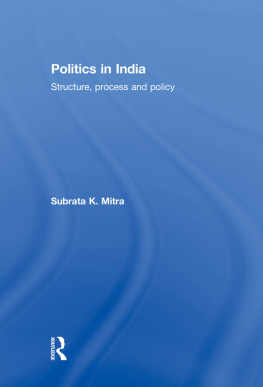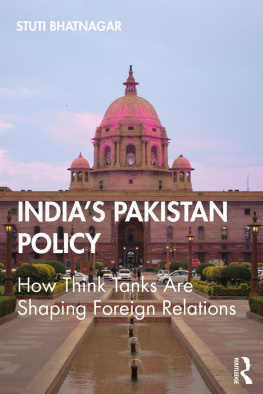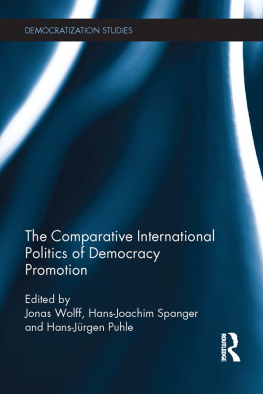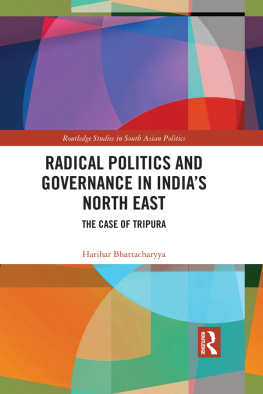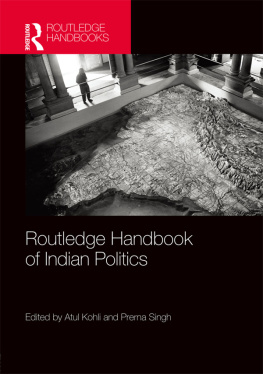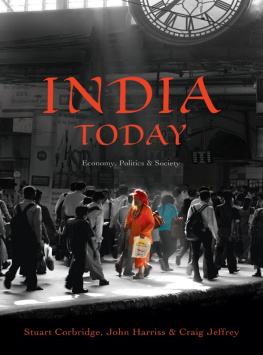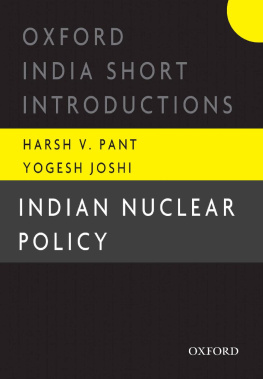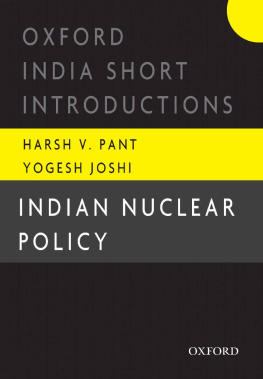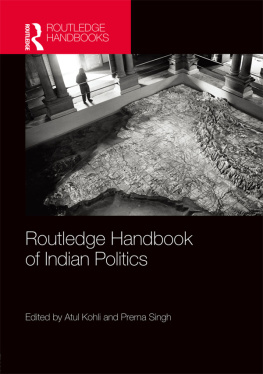Politics in India
Providing a comprehensive analysis of the broad spectrum of Indias politics, this introductory text explains the key features of politics in India in a comparative and accessible narrative, illustrated with relevant maps, life stories, visuals, statistics and public opinion. Familiar concepts of comparative politics are used to highlight the policy process, with a focus on anti-poverty measures, liberalization of the economy, nuclearization, and relations with the United States and Asian neighbours such as Pakistan and China.
The author raises several key questions relevant to Indian politics, including:
- Why has India succeeded in making a relatively peaceful transition from colonial rule to a resilient, multi-party democracy in contrast to her neighbours?
- How has the interaction of modern politics and traditional society contributed to the resilience of post-colonial democracy?
- How did Indias economy moribund for several decades following Independence make a breakthrough into rapid growth and can India sustain it?
- And finally, why have collective identity and nationhood emerged as the core issues for India in the twenty-first century?
Introducing the novice to India, this accessible, genuinely comparative account of Indias political evolution also engages the expert in a deep contemplation of the nature of strategic manoeuvring within Indias domestic and international context. In addition to pedagogical features such as text boxes, a set of further readings is provided as a guide to readers who wish to go beyond the remit of this text.
Subrata K. Mitra is Professor of Political Science at the South Asia Institute, Heidelberg University, Germany, and a Visiting Fellow at the Centre for the Study of Developing Societies, Delhi. His publications include The Puzzle of Indias Governance (2005), (co-author) A Political and Economic Dictionary of South Asia (2006), Modern Politics of South Asia (5 volumes, 2008), and Power, Protest and Participation (1992), all published by Routledge, and he is the series editor of the Routledge Advances in South Asian Studies series. He is currently engaged in a comparative study of marginality, empowerment and citizenship. Subrata Mitra is the coordinator of Governance and Administration, one of the four research areas of the Cluster of Excellence, Asia and Europe in a Global Context: Shifting Asymmetries in Cultural Flows at Heidelberg University, and supported by the German Research Council (DFG).
This is a superb, accessible and genuinely comparative account of Indias political evolution. Subrata Mitra has managed to write a book that both introduces the novice to India and also engages the expert in a deep contemplation of the nature of strategic maneuvering within Indias domestic and international political context. This is a book that every comparative politics scholar and student should read. I feel honored to have had the opportunity to read the manuscript.
Bruce Bueno de Mesquita, New York University and Hoover Institution, Stanford University
This is an impressive manuscript, which will speak effectively to a variety of audiences. It draws on Professor Mitras own varied and distinguished research, as well as a close acquaintance with the scholarship on Indian politics, to create an original, even personal statement, yet one deeply grounded in the best scholarship of all kinds. It offers a compelling overview of a complex and fascinating political system, combining both breadth and depth.
G. Bingham Powell, Rochester University
Subrata Mitra is a well-known figure in the study of Indian politics and throughout his distinguished career he has explored new avenues of research. I strongly endorse the publication of this book and I cant wait to recommend my students to use it.
Lawrence Sez, School of Oriental and African Studies, University of London
Politics in India
Structure, process and policy
Subrata K. Mitra

First published 2011
by Routledge
2 Park Square, Milton Park, Abingdon, Oxon OX14 4RN
Simultaneously published in the USA and Canada
by Routledge
270 Madison Ave, New York, NY 10016
Routledge is an imprint of the Taylor & Francis Group, an informa business
2011 Subrata K. Mitra
All rights reserved. No part of this book may be reprinted or reproduced or utilized in any form or by any electronic, mechanical, or other means, now known or hereafter invented, including photocopying and recording, or in any information storage or retrieval system, without permission in writing from the publishers.
British Library Cataloguing in Publication Data
A catalogue record for this book is available from the British Library
Library of Congress Cataloging in Publication Data
Mitra, Subrata Kumar, 1949.
Politics in India: structure, process and policy/Subrata K. Mitra.
p. cm.
Includes bibliographical references and index.
1. India Politics and government. 2. Democracy India.
3. Postcolonialism India. 4. Comparative government.
5. India Social conditions. 6. India Economic conditions.
I. Title.
JQ231.M56 2011
320.954 dc22
2010003328
ISBN 978-0-415-58588-0 (hbk)
ISBN 978-0-415-58589-7 (pbk)
ISBN 978-0-203-84686-5 (ebk)
Contents
Figures
Diagrams
Tables
Maps
Boxes
Preface
India gained Independence from British colonial rule on 15 August, 1947. The status of a free-standing actor in international politics came a little later, on 26 January, 1950, when the country became a republic. The new Republic of India chose, nevertheless, to remain a member of the British Commonwealth. The path that this ancient civilization took to Independence was different from many other non-western countries which became free in the twentieth century. India was liberated from colonial rule not through a violent overthrow of the colonial power, but on the basis of prolonged, mostly non-violent agitation and negotiation, leading to the transfer of power by the British rulers to their Indian successors. The process of the Transfer of Power through which Independence came has deeply affected the state, society, economy and the international profile of India.
When it came, Independence was marked by excitement and jubilation, but sorrow and anxiety as well. Unprecedented civil strife resulting from the partition of British India on the basis of religion marked the coming of Independence. Millions of Hindu, Muslim and Sikh refugees fled across the new frontier that divided British India into Pakistan and India the successor states which immediately locked into a lingering war over Kashmir. The memory of these events continues to affect domestic politics in India and Pakistan, embitters HinduMuslim relations, severely affects security in the subcontinent, and continues to poison relations between the two neighbours.
With the story of Independence in the background, this book raises several key questions. Why has India succeeded in making a relatively peaceful transition from colonial rule to a resilient, multi-party democracy in contrast to her neighbours, which also emerged from colonial rule at the same time as India? How has the interaction of modern politics and traditional society contributed to the resilience of post-colonial democracy? How have Indias local, regional and national leaders, straddling the modern state and traditional society, sustained First World institutions in the setting of a Third World society and economy? How did Indias economy moribund for several decades following Independence make a breakthrough into rapid growth, and can India sustain it? Why has India, long an advocate of peace and non-alignment, acquired the nuclear bomb, and what implication does this have for global order? And finally, why have collective identity and nationhood emerged as the core issues of India in the twenty-first century? The book formulates answers to these questions through facts, figures and narratives, leavened with a flavour of everyday life in Indias towns and villages. A set of further readings to guide readers who wish to go beyond the remit of this text is provided in .
Next page
